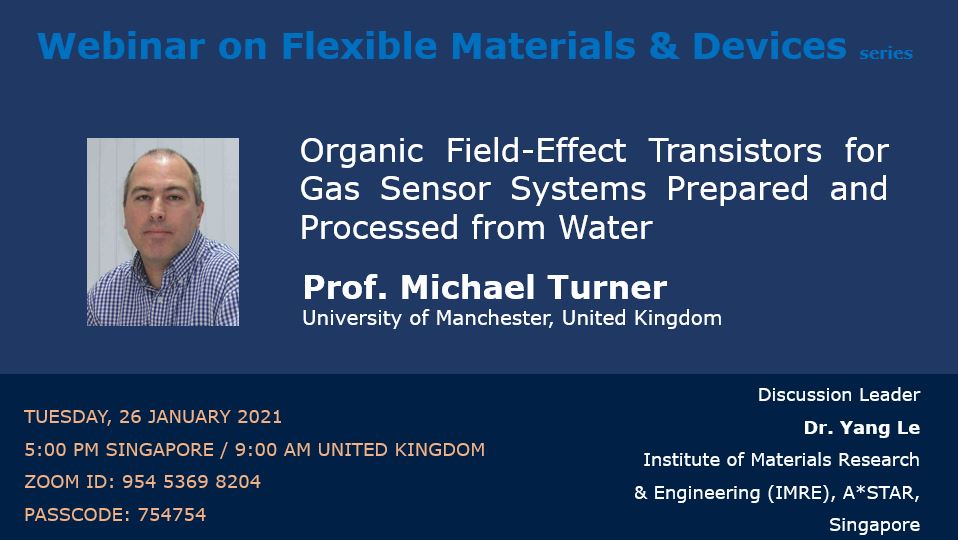Flexible Materials & Devices webinar
We are pleased to announce that Professor Michael Turner from University of Manchester will be our invited guest speaker for the upcoming webinar series on Flexible Materials & Devices.
The title of his talk is "Organic Field-Effect Transistors for Gas Sensor Systems Prepared and Processed from Water".
Do join us for his talk on 26 January 2021, Tuesday at 5:00 PM (Singapore Time) via Zoom Meeting.

Abstract:
Solution-processed organic field-effect transistors (OFETs) are being applied to ubiquitous sensing applications in environment monitoring, food waste management and digital health due to their excellent mechanical flexibility, light-weight, low-cost fabrication and ease of large-scale manufacturing. Sensor systems capable of analyte detection in a complex environment are possible as the individual OFET sensor elements deliver multiparametric outputs and high sensitivity as well as fast response/recovery times. To meet the portability and wearability requirement of the envisaged sensor applications, and for practical use, low-voltage operation of OFETs with good long-term environmental and operational stability is essential. Unfortunately, realizing this opportunity is hampered by increasing concerns about the use of volatile organic compounds (VOCs), particularly toxic halogenated solvents that are detrimental to the environment and human health to prepare and process the materials. Conventional methods for the synthesis, purification and deposition of conjugated polymers as thin-films in high performance organic electronics devices involve the use of large quantities of volatile organic solvents (VOCs) and this is particularly problematic for manufacturing scale-up. The processing of polymer semiconductors from colloidal dispersions in water has emerged as a more environmentally benign processing approach for organic transistors and solar cells. This lecture will discuss the development of gas sensors based on OFETs and a cradle-to-grave process to achieve high performance p- and n-type devices that utilizes aqueous-processes, fewer steps, lower reaction temperatures, and a significant reduction in VOCs (>99%) and avoiding all halogenated solvents.Biography:
Dr Mike Turner is Professor of Materials Chemistry and Director of the Organic Materials Innovation Centre within the School of Chemistry. He obtained his first degree and PhD from the University of Bristol, working with Professor Selby Knox on the synthesis of new organometallic complexes, before moving to the United States to work with Professor Harry Allcock investigating new routes to polyphosphazenes. He returned to UK to work at the University of Sheffield with Professor Peter Maitlis on the mechanism of the Fischer-Tropsch reaction and was awarded a Royal Society University Research Fellowship in 1993, to investigate the synthesis of novel polymers. He joined the Department of Chemistry, University of Sheffield as a Reader in 2000 and moved to the University of Manchester as Chair in Materials Chemistry and Director of OMIC since April 2004. Professor Turner is a coordinator of the Organic Materials for Electronics Consortium and was Senior Editor for Reactive and Functional Polymers from 2002 to 2008. He is Principal Investigator for the Knowledge Centre for Materials Chemistry at the University of Manchester, which is a virtual center of expertise providing multi-disciplinary research and innovative knowledge transfer based on world class capabilities in applied materials chemistry.A*STAR celebrates International Women's Day

From groundbreaking discoveries to cutting-edge research, our researchers are empowering the next generation of female science, technology, engineering and mathematics (STEM) leaders.
Get inspired by our #WomeninSTEM
.png?sfvrsn=b59474e9_3)